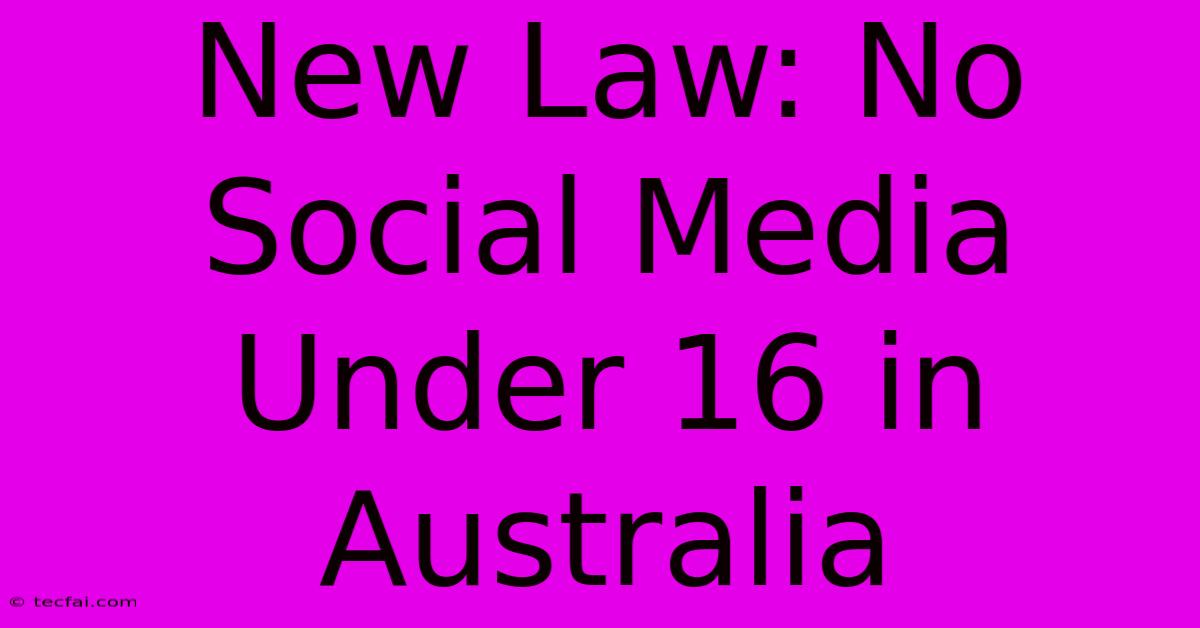New Law: No Social Media Under 16 In Australia

Discover more detailed and exciting information on our website. Click the link below to start your adventure: Visit Best Website tecfai.com. Don't miss out!
Table of Contents
New Law: No Social Media Under 16 in Australia – A Deep Dive into the Implications
Australia is taking a significant step towards protecting children online with its newly proposed legislation aiming to ban children under 16 from using social media platforms. This groundbreaking move has sparked intense debate, raising questions about its effectiveness, enforcement, and the broader implications for children's digital rights and parental responsibility. This article delves into the intricacies of this new law, examining its potential benefits and drawbacks.
The Core of the Legislation: A Ban on Social Media for Under-16s
The proposed legislation, while still undergoing parliamentary processes, aims to prohibit children under the age of 16 from creating and using social media accounts. This encompasses popular platforms like Facebook, Instagram, TikTok, Snapchat, and others. The core rationale behind the ban is to safeguard children from the potential harms associated with social media, including:
- Cyberbullying: The anonymity and reach of online platforms make them breeding grounds for cyberbullying, inflicting significant emotional distress on young people.
- Exposure to inappropriate content: Children may be inadvertently exposed to violent, sexual, or otherwise harmful content that is not age-appropriate.
- Mental health issues: Research increasingly links excessive social media use to anxiety, depression, and body image issues, particularly among adolescents.
- Privacy concerns: The collection and use of children's personal data by social media companies raise significant privacy concerns.
- Addiction and time management: Social media can be highly addictive, leading to neglecting schoolwork, social interactions, and overall well-being.
Enforcement Challenges and Parental Responsibility
A crucial aspect of this legislation is its enforcement. How will the government ensure compliance? Will social media companies be held responsible for verifying users' ages? The legislation likely relies on a combination of strategies:
- Age verification measures: Social media companies may be required to implement robust age verification systems, potentially using ID verification or parental consent mechanisms.
- Parental responsibility: Parents will undoubtedly play a crucial role in ensuring their children adhere to the law. This emphasizes the importance of digital literacy education for parents and children alike.
- Fines and penalties: Strict penalties for both social media companies and parents who fail to comply are anticipated, acting as deterrents.
However, the enforcement mechanisms remain a point of contention. The scale of the task – monitoring millions of users – presents a significant challenge.
Balancing Protection with Freedom of Expression
Critics argue that the legislation infringes on children's rights to freedom of expression and access to information. They suggest that a complete ban is overly restrictive and that alternative strategies, such as improved parental controls and comprehensive digital literacy programs, may be more effective.
Furthermore, the ban might push children towards using social media in secret, potentially making it harder for parents and authorities to monitor their online activity and protect them from harm. This underscores the need for a balanced approach that prioritizes safety without unduly restricting access to valuable online resources.
The International Perspective and Future Implications
Australia’s proposed legislation sets a global precedent. Other countries are grappling with similar issues, exploring various approaches to regulate children's online activity. The success or failure of this Australian initiative will have significant ramifications for international policy development.
The ongoing debate emphasizes the urgent need for a multi-pronged strategy to address the complexities of children's engagement with social media. This includes not just legislation but also proactive measures such as:
- Enhanced digital literacy education in schools: Equipping children with the skills to navigate the online world safely and responsibly.
- Collaboration between government, social media companies, and parents: A united front is essential to effectively protect children online.
- Continuous monitoring and evaluation of the law's effectiveness: Regular review and adaptation are crucial to address unforeseen challenges and ensure the law remains relevant and effective.
The future of children's online safety in Australia hinges on the successful implementation and ongoing refinement of this new law. The debate is far from over, and its outcome will shape the digital landscape for generations to come.

Thank you for visiting our website wich cover about New Law: No Social Media Under 16 In Australia. We hope the information provided has been useful to you. Feel free to contact us if you have any questions or need further assistance. See you next time and dont miss to bookmark.
Featured Posts
-
Hummels Heroics Spurs Europa League Draw
Nov 29, 2024
-
Late Runway Fashion Flight Disruption
Nov 29, 2024
-
Kings Beat Jets Kopitar Kempe Shine
Nov 29, 2024
-
Bbc Loses 13 Wallace Exits
Nov 29, 2024
-
Man United Bodo Glimt Europa League Score
Nov 29, 2024
